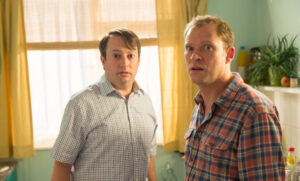Stop me if you’ve heard this one. A man’s wife divorces him and shacks up with his boss. Soon after, a friend suggests that he should remarry. “What for?” he asks. “Are you looking for a wife as well?”
It may not be the funniest joke, but that’s because it’s an anecdote from The Lives of the Caesars by the Ancient Roman historian Suetonius. The comedian in this case was a senator called Aelius Lamia whose wife had left him for the Emperor Domitian. For making this casual quip, Domitian had Lamia put to death. Now that’s a bad review.
It might be worth keeping this anecdote in mind when the usual debates flare up about whether comedy “goes too far”. The notion of people being offended by jokes is as old as comedy itself, and often people react angrily if humour isn’t to their taste. The current manifestation of this age-old debate takes the form of a simple dichotomy: “woke comedy” versus “anti-woke comedy”.
Already we are in treacherous waters. It is very unwise to define whole genres by terms that have no settled definitions. The actor Kathy Burke believes that “woke” simply refers to people who are neither racist nor homophobic, which would surely mean that the overwhelming majority of us would happily embrace the term. But for those who have been on the receiving end of the bullying, harassment and intimidation by activists who self-define as “woke”, it is clear this issue is not so straightforward.
Over the past few years, we have seen the emergence of a new comedy movement, one branded by commentators as “anti-woke”, that seeks to push back against the orthodoxies of our time. Its closest historical precedent is the “alternative” comedians of the Eighties, who also took aim at establishment norms and were often similarly blunt in their approach. The key difference today is that there is no broad agreement about where the power in society lies, and so while “anti-woke” comedians see themselves as anti-establishment, their critics insist that the opposite is true.
Consider the example of Ricky Gervais, whose new Netflix stand-up special Armageddon has sparked this most recent round of discussions about the supposed red lines in comedy. Some have accused Gervais of taking a reactionary stance, most notably because of jokes relating to migrants and disabled children. Gervais has been branded an “anti-woke” comedian, but I doubt very much that he would see it in such reductive terms. Anyone familiar with his work will know that he has always lampooned closed systems of thought, and it just so happens that “wokeness” currently represents the dominant incarnation. There was a time when many of Gervais’s critics were perfectly happy to see him take a wrecking ball to the certainties of religious faith. It would appear they take a different view when it’s their own belief system taking a battering.
A simplistic reading of “woke” versus “anti-woke” comedy is that the former “punches up” while the latter “punches down”, but such rules are incoherent when applied to an inherently anarchic medium. Besides, it simply is not true that there exists a growing number of comedians who are seeking fame and easy laughs by taking aim at the most marginalised in society.
As I have said, it comes down to a question of how one perceives power. Too often the culture war is misconceived as a conflict between Left and Right, with “woke” aligned with the former and “anti-woke” with the latter, but “wokeness” carries with it the kind of clout that transcends the political binary. In their 13 years of government, the Conservatives have presided over the worst excesses of this identity-obsessed ideology and the havoc it has wrought on society. Far from fighting a “war on woke”, they have been actively enabling it.
So where does the real power lie? Is it with governments that can be voted out if the public tires of them? Or is it with activists who now have significant influence in all cultural, educational, political and corporate institutions, and who cannot be dislodged by means of any democratic process? These are the same zealots who have fostered racial division in the name of “anti-racism”, jeopardised the rights of women and gay people through the promotion of gender identity ideology, destabilised the very notion of empirical truth, attempted to rewrite our history and reconstruct our culture, and launched a relentless assault on free speech and the achievements of social liberalism. Just because they describe themselves as being “on the right side of history” doesn’t make it true.
And so, when we read an article in the New Statesman lamenting the “tedious world of anti-woke comedy”, we can be fairly sure that the criticism is political. Does the writer sincerely believe that these performers are simply trying to attack minorities and cause as much offence as possible? This is the least generous of all suppositions, one born out of a fundamental misunderstanding of the art of comedy. It strikes me that many of those who dismiss stand-ups as “anti-woke” are simply berating them for taking an anti-establishment stance and for believing that those in power ought to be ridiculed rather than eulogised. But what is the point of a court jester who acts as a propagandist for the king?
Another common reaction from critics has been to imply that certain topics ought to be ring-fenced, and that joking about them is tantamount to a form of violence. The charity Scope has lambasted Gervais’s new show for containing “ableist slurs” and claimed that “language like this has very real consequences”. But those of us who have seen Armageddon would have to concede that the most obvious consequence appears to be the laughter of audience members who are clearly enjoying themselves. What Gervais’s critics mean is that jokes are like toxins, and that popular culture — if not carefully regulated — has the power to corrupt the Great Unwashed. Mary Whitehouse made the identical argument many decades ago.
Fortunately, her fears were unfounded. Over half a century of research into “media effects” theory — the hypothesis that the public will modify its behaviour according to the mass media it consumes — has seen it roundly discredited. Jokes do not cause violence, unless you are talking about Will Smith slapping Chris Rock at the Oscars, or the Emperor Domitian lopping off the occasional head.
The history of comedy shows us that its practitioners will always cause offence, so why do we continue to squabble over where the red lines ought to be drawn? No matter how many times you shift the boundary, it will still end up being crossed. I am not implying here that there is anything wrong with criticism, however puritanical it might be. Comedians who violate popular sensibilities have always faced pushback and resentment. The problem arises when the offended parties seek to impose their tastes on everyone else. So while I support anyone’s right to criticise Gervais’s show, I am disturbed by those who have called on Netflix to censor the offending material.
Personally, I have always relished those comedians who have no clear affiliations, who take aim in all directions and unsettle as much as they entertain. But today’s comedy industry is not a hospitable environment for these sorts of freethinkers. For some years now, there has been an undeniable strain of groupthink among those in positions of power: promoters, commissioners, critics and even some performers. Acts who conform have been rewarded, while those who refuse to do so have been shunned. It hasn’t taken much for up-and-coming comics to realise that it is more profitable to be seen to convey the “correct” message rather than to develop their craft in innovative and individual ways. The impulse to serve Mammon rather than the Muses has enervated the comedy scene, and self-censorship is now the norm.
The writer Graham Linehan is living proof of how heretics are treated in the current climate. For blaspheming against the holy creed of gender identity ideology — one embraced wholesale by the gatekeepers of the comedy industry — he has been unable to work for six years. In his new memoir, Tough Crowd, he discusses how his musical adaptation of Father Ted has been scotched, either because the bosses at Hat Trick Productions (which owns the rights) are too cowardly to be seen promoting his work, or because activist elements within the company disapprove of his views.
Only a couple of decades ago, it was virtually unheard of for comedy promoters to take seriously complaints from audience members claiming to be “offended”. Now, it takes little more than a few disgruntled tweets for venues to panic and cancel bookings. But the backlash is palpable. Many of us have grown weary of comedians toeing the establishment line and substituting agitprop for jokes. Some “anti-woke” comedy may lack sophistication and subtlety, but maybe that’s a small price to pay to redress the balance and reenergise the art form. If you want to smash taboos, sometimes you need a sledgehammer.
Disclaimer
Some of the posts we share are controversial and we do not necessarily agree with them in the whole extend. Sometimes we agree with the content or part of it but we do not agree with the narration or language. Nevertheless we find them somehow interesting, valuable and/or informative or we share them, because we strongly believe in freedom of speech, free press and journalism. We strongly encourage you to have a critical approach to all the content, do your own research and analysis to build your own opinion.
We would be glad to have your feedback.
Source: UnHerd Read the original article here: https://unherd.com/




